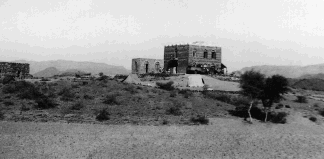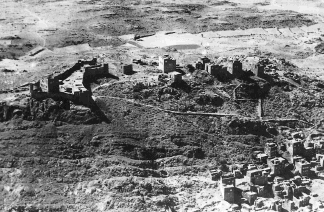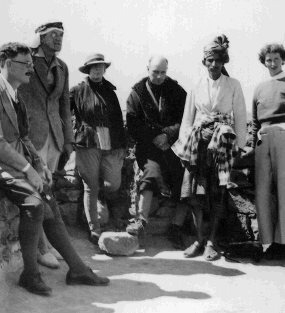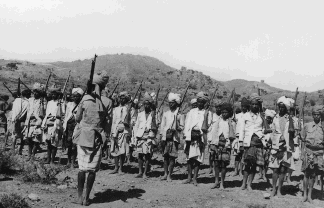
News and events
Search
Journal articles
Book reviews
About the Society
Society officers
Annual reports
Obituaries
Annual appeal
Membership
|
|
|
|
Christmas
in Dhala, 1939
by
Helen Joly de Lotbinière
Helen de Lotbinière arrived in Aden in late 1939 to join her husband, Edmund, a Captain in the Royal Engineers, who had been posted there shortly after the outbreak of World War II. She was then 27 and it took all her youthful determination to overcome bureaucratic and other wartime obstacles to her travelling overseas. Married accommodation in Aden was then at a premium, but Edmund succeeded in finding a small mud-brick house in a walled garden in Sheikh Othman for them to rent.
Helen had an adventurous spirit worthy of her father, H.T. Ferrar, the New Zealander geologist on Scott’s first expedition to the Antarctic. This, her unaffected charm and striking good looks won her friends and admirers in all walks of Aden’s expatriate society. Her letters home are those of a naturally gifted writer with an artist’s eye for detail, and offer vivid and entertaining impressions of life in Aden between 1939 – 1941. The Editor is grateful to her niece, Virginia Forbes, for permission to publish extracts from Helen’s early letters describing her new home in Sheikh Othman, and the visit which she and Edmund made to Dhala in December 1939 at the invitation of Freya Stark and Stewart Perowne. Freya’s own account of this visit was published in ‘The Times’ on 28 March 1940 and later reproduced in her book ‘East is West’ (1945). Helen died in 1953.
27 October 1939
‘Everything is so thrilling and romantic that I scarcely know where to begin an attempt at description. I am sitting in a garden of date palms and yellow-flowering shrubs (one is henna which has a very heavy, sweet scent), beside a well and a small swimming pool; the gardener is leading a camel up and down an earth ramp, which by means of ropes and pulleys causes a leather bucket, shaped rather like a kettle, to fill at the bottom of the well, and then to rise with a pleasant squeaking and groaning of wooden tackle, to spill its contents into the pool; the pool is a concreted tank standing above the ground about 4 ft. high, and 6 yds. by 3 yds.; the water is deliciously cool and slightly brackish. A flock of pretty little Persian bulbuls are enjoying the garden too. In fact I am in an Arabian garden, in an oasis, in a desert of Southern Arabia!’
 |
| |
|
Helen and
Edmund Joly de Lotbinière with Antonin Besse
(wearing bow tie) and a naval visitor, Aden, 1940. |
The oasis was Sheikh Othman where Helen’s husband Edmund had rented ‘an Arab mud-brick house of two rooms, one below and one above, set in the garden in which I am now sitting. We have five Somali boys to look after us, the bare necessities in the way of furniture and eating utensils, and the luxury of five Persian carpets to cover the broken concrete floors… Sheikh Othman is an Arab village of mud-brick buildings [where] a few industries are carried on in a haphazard manner, such as brick-making, cloth weaving and dyeing, pottery etc. There are about a dozen houses set in gardens like ours, occupied by Indians, Arabs and a few British people… and the Scottish Medical Mission. Then there are the Government Gardens, and the rest is desert. The Arabs are a very colourful, gay and friendly community – all smiles, greetings and curiosity. There are a great many Somalis from across the Gulf of Aden, who are taller [and] darker skinned ... the night comes suddenly at about 6pm; the stars above the waving palm tops are brilliant, and the quiet from the desert is more powerful than the buzz of noise coming from the village.’
Helen and Edmund were invited by Freya Stark and Stewart Perowne to spend Christmas with them at Dhala, in the mountainous hinterland of the Protectorate, an opportunity to travel outside Aden which they eagerly grasped.
22 December
‘The great day at last!... At 9.30 am Freya and Stewart arrived in a box-body Ford to pick us up. Away we went, careering over the roadless desert towards the mysterious mountains already shimmering purple in the heat. You can imagine my excitement – that wonderful, ecstatic feeling when one is setting forth into the unknown! I could have laughed and sung and clapped my hands for joy, but I curbed my primitive outbursts in deference to our companions who are definitely of a higher order than the usual run of mankind… We crossed the ten miles of sandy desert to the oasis of Lahej, which is quite a large strip of fertile land where the rivers emerge from the hills, and the water emerges from beneath the river beds to be used for irrigation before it loses itself in the desert… We tottered down into one of the waterless wadis, which formed our road for the next sixty miles: an arid boulder-strewn gash in the fantastic volcanic mountains, sometimes a mile wide, sometimes barely wide enough for the car; it winds and twists this way and that, and we bump and rattle and crash and crash again. Sometimes it looks as though we have come to a sheer rock wall and that there is no possible way out of these oppressive red, purple and black mountains, but at the last minute there is a narrow turn, and on we go. What is so surprising is the astonishing variety of trees, shrubs and flowers – bright red and yellow flowers on leafless, almost branchless trees… ’
Five miles from Dhala the battered Ford’s rear axle broke in half, and they had to complete their journey on foot.
‘… the air was cool and exhilarating like our beloved New Zealand mountains… .We walked for about a mile up the last stretch of the gorge, where the trees became larger and leafier with every bend; and on either side of us the rock walls rose almost perpendicular, but with sufficient ledges for villages to maintain a hold far above us, scarcely distinguishable from the rock from which they were hewn. The women and children were terrified by the sight of four pale-faced Europeans walking, and they set up a frantic hullabaloo, shrieking, crying and dashing wildly about on the rocks; a handful of men and small boys were very brave, and came down into the wadi-bed to walk at a discreet distance behind us.. Suddenly we were faced with the true end of the valley, the Khureiba Pass up to the Dhala plateau, which lies at about 5000 ft. We zig-zagged up a track which would have been rather alarming in the car, and I was thankful to be on my two flat feet. We came out onto the plateau as night fell. The stars came out above the jagged mountains, the half moon rose to light our way, the crickets warbled shrilly in every little thorn bush, and we walked with joy and peace. About half way across the plateau is Sufrah, the Government Guard Post,… [and beyond] the Rest House, where dinner, baths and beds awaited us’.
23 December
‘The view from the Rest House is glorious; it is perched on a little rise of its own, and the yellow, uneven, part-cultivated country slopes away on all sides to the rim of hills and mountains; in one direction is the Arab town of Dhala, with the Amir’s medieval walled castle above it; behind us is the huge pile of Jebel Jihaf, 8000 ft.; and to the North the high, level, wall-barrier of the unfriendly Yemen… The Italians have gained influence in the Yemen, and Aden feels that it must guard against attack from that quarter should the Italians come into the war against us. Freya and Stewart, in a most tantalising manner, have been discussing the possibilities of getting into the Yemen to spread British propaganda. Yesterday, Col. Lake [Deputy Governor] and Arthur [Bentinck, the Governor’s ADC] arrived at tea time. When the sun has lost its heat, the wind is piercingly cold; but Arthur and I, to everyone’s horror, wrapped ourselves up in coats and rugs and sat outside to watch the sunset lights on the mountains, until we were driven in by the cold at about 7.30pm. Then we all spent the evening huddled round the pressure lamp: Freya reading Job in Hebrew, Stewart reading Milton, Col. Lake reading a two months’ old Times, Arthur scrabbling through an attaché case full of correspondence [and] Eds [Edmund] reading a modern novel!’
‘Today we have had two official calls, one from the Amir of Dhala [Nasr bin Shaif], and one from his son [Haidera], the Amir of Jebel Jihaf. We watched them come out of the castle gate… cavorting towards us on their Arab ponies, with their guards running on foot beside them. The countryside is full of activity – men working in their small patch-work fields of millet, warriors jog-trotting on foot, slung about with every kind of weapon; traders with three or four loaded donkeys; women walking gracefully along every path, in orange and black striped garments, with earthenware water jars on their heads, or more often petrol tins flashing in the sunlight; and children everywhere. Men, women and children are all friendly and very inquisitive, though the women are inclined to be shy and to relapse into giggles. The whole scene is like some of those old Italian landscapes with so much distance and detail that they captivate one’s imagination completely – I never thought they could be real, but now they have come alive before my eyes.’
24 December
‘This morning we returned the Amir’s call. Freya and I put on stockings, and scarves over our heads, [so as] not to offend Mohammedan eyes. We drove to the village, and then walked up a rocky pathway winding through, round, and above the stone houses of the little town to the steps of the great arched door in the castle walls; there stood the Amir to receive us, with his son and innumerable guards and hangers-on, each one more ruffianly than his neighbour… but none the less a welcoming and pleasant crowd. The castle walls have round towers at each corner, and inside there is a tall keep in which the women are housed, and various other buildings, all of stone, unmortared, and sloping gradually inwards as they climb to four or five storeys. We were given tea flavoured with rose-water, sitting on hard kitchen chairs in the Amir’s official reception room, which [also] housed a table, a wireless set, and photos of our King and Queen and of the Amir’s family… We sat with long silences, and patches of conversation which appeared to be prompted by spasmodic inspiration rather than a flow of thought... Freya and I visited the Harem in the keep, and found one wife, and one daughter by a former wife, and countless slave women and children. The wife and daughter were beautifully dressed in Indian silks, with bracelets, rings, necklaces, and ear-rings… The Amir then conducted us round his town; we saw the dispensary (astonishingly clean and cool), the school for about 30 boys, and the Jewish quarter [whose community] lives amicably beside the Arabs, executing all the crafts, leather work, silver work and so on.’
 |
| |
| The Rest
House, Dhala |
‘This afternoon Stewart took us for a walk through choppy little hills to a cemetery for the men who died while up here in 1903 to mark the boundary between the Aden Protectorate and the Yemen, which was then in Turkish hands (during the 1914–18 war the Turks came right down to Sheikh Othman, and used to exchange fresh foods grown in the oasis for distilled drinking water from the British port – Col. Lake was here all through that period, and has many interesting stories to tell). The cemetery is a very lonely and desolate spot, and of course completely neglected, so Stewart is arranging for a rough stone cairn to be erected, and for a brass tablet with the names set in it…’
25 December
‘A never-to-be-forgotten day! Almost the best Christmas Day I have ever had – if only all my family could have shared it with me. First thing in the morning we each found a Christmas stocking which Freya had put together for us! She is such a sweet person, as well as being so amusing and interesting and clever. Then we all dressed in clothes fit for riding, and after breakfast there assembled the most amazing collection of English, Arabs, horses, donkeys and baggage, and we set off to spend the day on Jebel Jihaf.’
 |
| |
| The Amir’s castle,
Dhala |
‘We wound our way up, up, up, and still up an apparently uninhabited rocky land, until we came over the rim into a magic [world] hanging beneath the sky – a land of crags and castles, cactus and cultivated terraces, alive with human activity, and stretching away on all sides the blue hazy distance of jumbled range on range. We went to visit the Amir of Dhala’s son [Amir Haidera] in his airy fortress above the world. This Jebel Jihaf is difficult to describe – it is a great chunk of a mountain above the Dhala plateau, with a kind of bashed-hat crown in which are many fortress villages, terraced fields and wells, so surprising after the two hour climb on horse-back up rocky trails which one would imagine led nowhere, unless to the Giant’s castle at the top of Jack’s beanstalk! The Arab ponies look as though they are on the brink of death, but they are the toughest little creatures imaginable, and climb rock faces like cats; I was mounted on a mare with a U-back, and a sucking foal at her heels, but she never faltered, though I did once or twice, and preferred my own feet. Having reached this wonder upland, we spent another hour winding our way across it until we were within sight of Amir Haidera’s dar, the six-storeyed tower with small walled courtyard set on the loftiest peak of the mountain. Below this peak we were met by about 200 of the Amir’s troops, who fired off their rifles into the air, and danced and sang to the beating of drums. The Amir dashed down on a wild looking pony and gave a fine exhibition of horsemanship, which excited all the other horses into leaping up and down stone walls and generally enjoying the occasion. The army formed a guard of honour on either side of the zig-zag stairway up which our horses stepped unconcernedly to the gate into the courtyard. This dar is typical of the fortress tower of every village – they are always built at the highest point of the village and the population retires into them at time of siege; they are dry-stone-walled with a batter [sloping face], five or six storeys high, two or three low-ceilinged rooms to each floor, small windows on the floor level with wooden shutters; the interior walls of this dar are white-washed and decorated in geometric patterns of red, black and yellow. Before lunch we were taken up onto the roof to see the view, which was magnificent; mountains and valleys of course, but on such a gigantic scale that it took one’s breath away. Job’s tomb is said to be on one of the mountains to the West… We were then given a lunch of Arab food – titbits of mutton and chicken to begin with, followed by a huge bowl of rice and highly spiced meat which was delicious; after that the sweet course of unknown spicy cereals, and lastly honey eaten with spoons out of small gourds… Freya and I visited the Harem; two much prettier wives than those at Dhala, but just as vacant and inanimate, and almost certainly consumptive. We sat cross-legged on the floor, and Freya chatted with them until the Amir joined us, when they relapsed into complete silence – apparently they may not speak when their lord and master is present unless he addresses them directly… Col. Lake, Eddie and I did the homeward journey on foot… we hurled ourselves madly down the 3000 ft. [drop] by a tremendous valley gash in the mountainside, and arrived at the Rest House at about 6pm, very thirsty, pretty tired and blissfully happy.’
 |
| |
|
Amir
Haidera bin Nasr with ( from left to right)
Edmund, Col. Lake, Freya Stark,Arthur
Bentinck and Helen during their visit to his
fort on Jebel Jihaf. |
27 December
‘Col. Lake and Arthur left early to return to Aden. Freya and Stewart wanted a quiet day writing… so Eds and I set off on an adventure of our own. Our objective was the top of an inviting mountain about 7000 ft. high called Jebel Mafari, which even Col. Lake has not climbed. We set off on ponies with one pock-marked henchman, who tried to make us stop and rest every quarter of an hour, and indicated that it was quite impossible to reach the slopes of the mountain at all; however, we brutally kept him moving, and followed our own sense of direction until the inevitable band of cheerful ruffians began to attach themselves to us, and entered into the spirit of the expedition. At every small group of dwellings we were offered hospitality, tea out of rusty tins and flat round chapattis of millet flour. We left the horses at about 2000 ft. below the top of the ridge, and had a very hot, steep scramble up a semi-precipice until we came up onto the long knife-edge ridge which runs for perhaps a mile gently upwards to culminate in a rocky knob with a village and dar. Our arrival was a tremendous event for the villagers as the women had not seen white people before!... They gave us blessed water to drink from their earthenware drinking vessels…[and] their courtesy and hospitality was such that we could not have hesitated to accept everything they offered. Then, having done all they could do for our comfort, the headman made the whole community sit in a massed body about ten yards from us to watch us eat our sandwiches; there was a gabble of excited interest, and we threw them smiles and nods at intervals. After expressing our appreciation and thanks as elaborately as we were able, we set off on the return journey. Our wild looking guides led us directly to the top of the precipice on the North of the knife-ridge, and we looked straight down a rock wall for about 2000 ft. to the gentler slopes of the mountain; for a moment we each had a fleeting suspicion that we were to be pushed over! But they showed us a perpendicular crack down the face of the wall, in which zig-zag steps were cut the whole way down – and down we went... until our knees had almost turned to water. The ponies had been brought round to meet us, and with many handshakes and farewells we headed for the civilisation of the Dhala plateau.’
 |
| |
| Guard of Honour, Jebel
Jihaf |
28 December
‘We made the return journey to Aden, bumping and bucketing down the wadi beds to the hot desert land. In Lahej we paid a call on the Sultan [Abdul Karim bin Fadhl], who entertained us in a large garden-room furnished by Waring & Gillow, [and] again we were offered tea flavoured with rose water. The Sultan has quite an air about him, is westernised and speaks English, but… pretends that he cannot; all the conversation was in Arabic, so Eds and I sipped our tea in silence. [We] arrived at our dear little dwelling place in the late evening to find letters from home, and flowers and welcoming notes from friends.’
Vol
14. 2006
|
|
